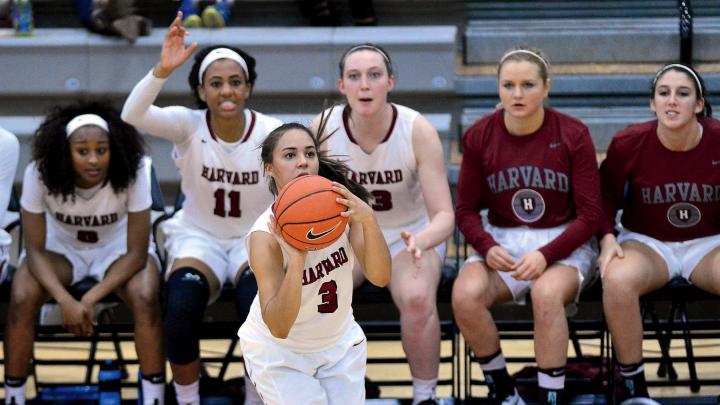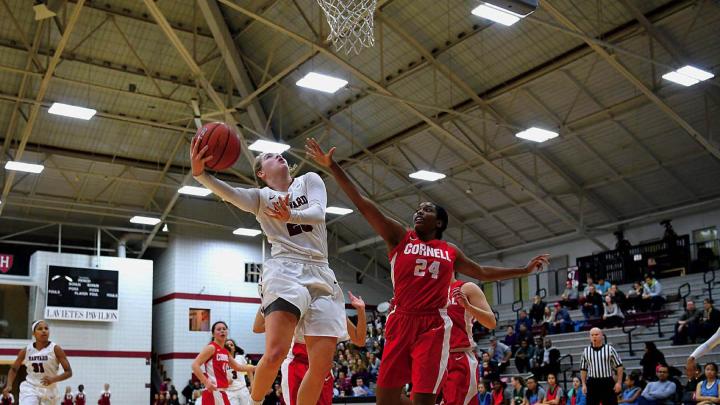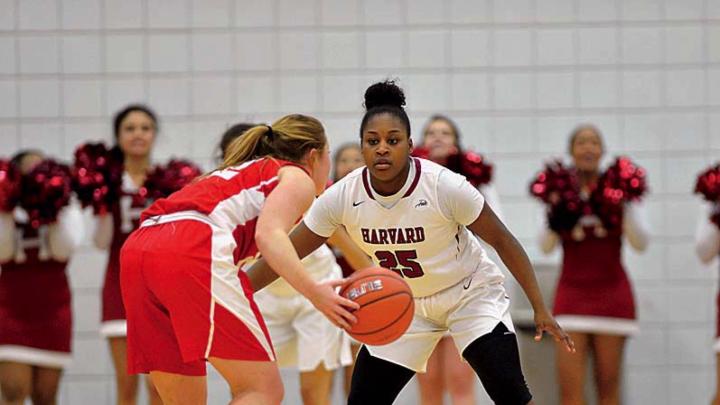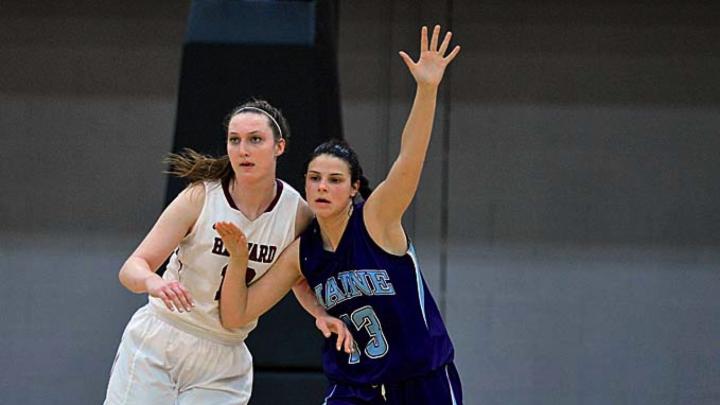As the crow flies, it is just under 270 miles from Lavietes Pavilion to the Palestra. Yet entering the season, the Harvard men’s and women’s basketball teams anticipated a long and arduous path from their home gym to the site of the inaugural Ivy League basketball tournaments—Penn’s Palestra arena, the “cathedral of college basketball.”
Stemberg men’s coach Tommy Amaker’s squad would begin the season with a 7,000-mile trek to Shanghai to play Stanford in the second annual Pac-12 China Game. Women’s head coach Kathy Delaney-Smith and her team would accumulate plenty of domestic frequent-flyer miles, with visits to Minnesota and Kansas. Both squads faced the challenge of melding extremely talented freshman classes with a returning core of upperclassmen who had fallen short of the Ivy title the previous year.
Could Harvard basketball bounce back?
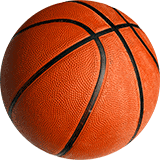 Harvard Hardwood
Harvard Hardwood
Sign up for Harvard Magazine’s basketball e-mail and follow the Crimson all season long! David L. Tannenwald ’08 will provide the latest news, game summaries, and insights as the Crimson chase another Ivy title and NCAA berth!
For Delaney-Smith, the conclusion to the 2015-2016 season—a 76-50 drubbing at Hofstra in the opening round of the Women’s National Invitation Tournament—left a sour taste. The 2016-2017 campaign opened with another disappointment: the Crimson lost a 103-87 shootout at the University of Minnesota.
But from there, the women went on one of the most impressive runs in program history. It began unassumingly: a trio of home wins against Maine, Samford, and Fairfield, along with road victories against Boston University and Sacred Heart. The winning streak was encouraging, but it came against low- and mid-major programs that the Crimson expected to beat.
Then came Temple. The Lady Owls were predicted to finish second in the high-powered American Athletic Conference behind only the University of Connecticut, winners of three consecutive national championships. But Delaney-Smith—the winningest head coach in Ivy League basketball history—and her team were ready. After falling behind 11-3 to start the game, the Crimson scored 10 straight points to take the lead, an advantage they never surrendered en route to a convincing 73-62 victory. Following the game, Delaney-Smith suggested that her team caught the Owls by surprise: “I think they were shocked by us, to be honest.”
As non-conference play wore on, it became harder to take the Crimson lightly. After easily dispatching the New Jersey Institute of Technology, 59-38, Harvard traveled to Kansas and knocked off the Jayhawks, 69-59, at historic Allen Fieldhouse. Following a break for exams, they then defeated Siena and won the Fordham Holiday Classic, including a win over previously undefeated Buffalo in the tournament championship.
The women were winning with an exceptionally balanced attack. Freshman point guard Katie Benzan was the team’s leading scorer, and six-foot-three classmate Jeannie Boehm was a force in the paint. Delaney-Smith surrounded them with outstanding shooters like Madeline Raster ’19 and Sydney Skinner ’19. This meant that Harvard could attack from multiple positions, as it did in the Kansas game, when four of five Crimson starters scored in double figures, and the fifth—sophomore Sydney Skinner—had nine points.
The team paired its skill with mettle. The Crimson came from 10 points down to beat La Salle on the road, and, as Ivy competition began, had a come-from-behind victory at home over Dartmouth. Then the schedule of back-to-back Ivy weekend games began, with a pair of squeakers at home: a 62-59 win over Cornell and a 70-68 victory over Columbia that Raster clinched with a game-winning jumper with 4.9 seconds remaining.
Raster’s heroics pushed the Crimson’s win streak to 16 games (tied for a program record) and set up an early Ivy showdown at Penn, the pre-season pick to win the league, and Princeton, which has appeared in the last two NCAA tournaments.
That first February weekend marked the end of the winning streak. On Friday night, the Quakers, who are also the defending league champions, throttled the Crimson 63-43. The following evening, Harvard fell to the Tigers, 63-58, in overtime. The setbacks provided a powerful reminder that, as successful as the Crimson had been in non-conference play, knocking off the league’s reigning powers would not be easy.
The men’s team was similarly eager to move on from last season, the first since 2010 when they failed to earn at a least a share of the Ivy championship. It took them a little while to hit their stride.
After falling to Stanford 80-70 in Shanghai, the Crimson lost its next three games against Division I competition. Following the last of those, a 77-74 defeat at home against George Washington, Amaker lamented that his team was not doing “the little things” that were necessary to win: protecting the ball on offense, rebounding, and defending without fouling.
The comment pointed to the difficulty of relying so heavily on the team’s highly talented freshmen. The seven first-year players—rated by ESPN as the tenth-best recruiting class in the country—could make extraordinary plays. Seth Towns’s thunderous baseline dunk in Shanghai was a case in point. But they were also prone to mistakes, as when Towns and Chris Lewis fouled out during a Thanksgiving weekend contest at the University of Massachusetts.
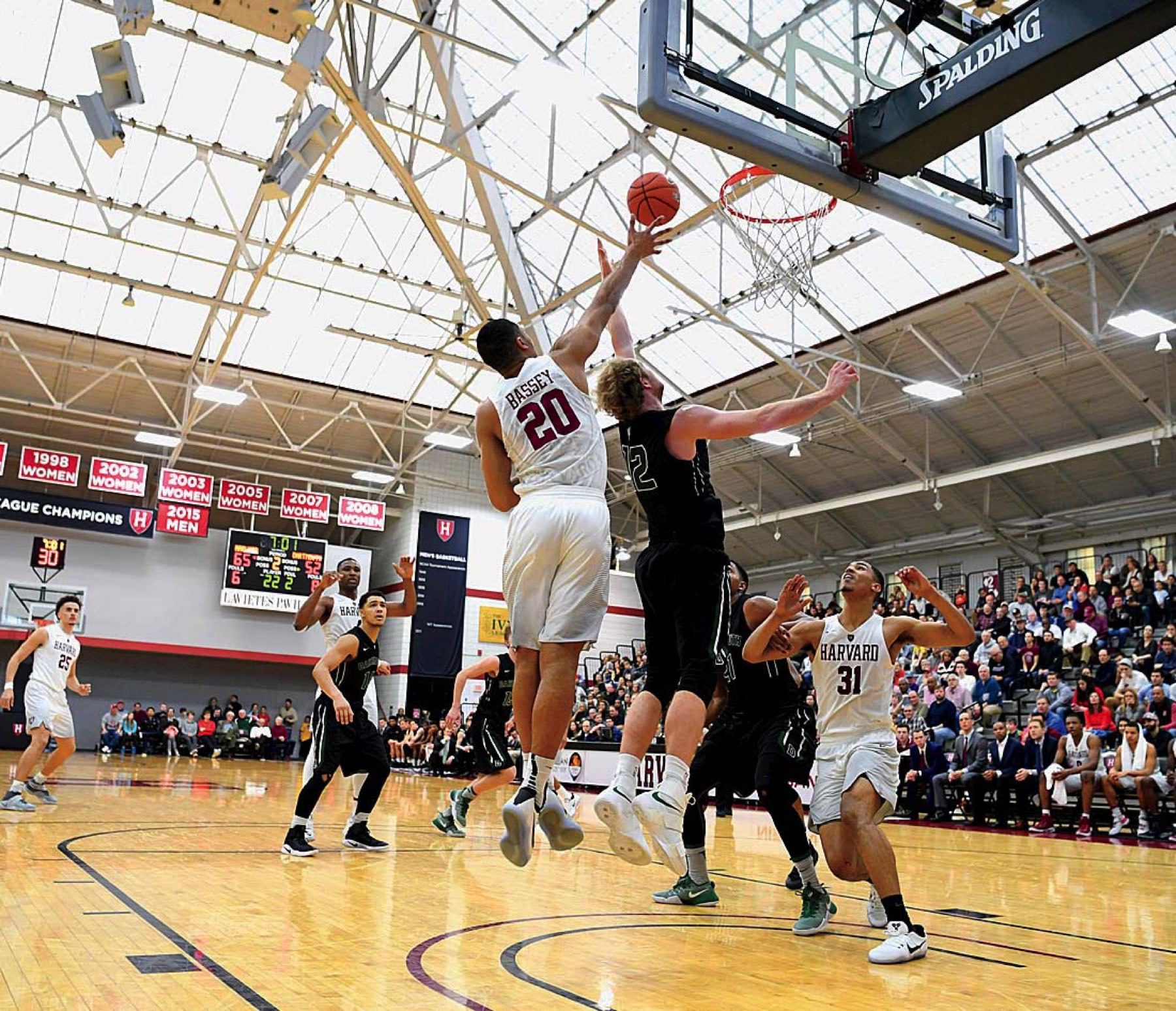
First-year Justin Bassey (#20) is part of one of the most talented freshman classes in Harvard history…
Photograph by Gil Talbot/Harvard Athletic Communications
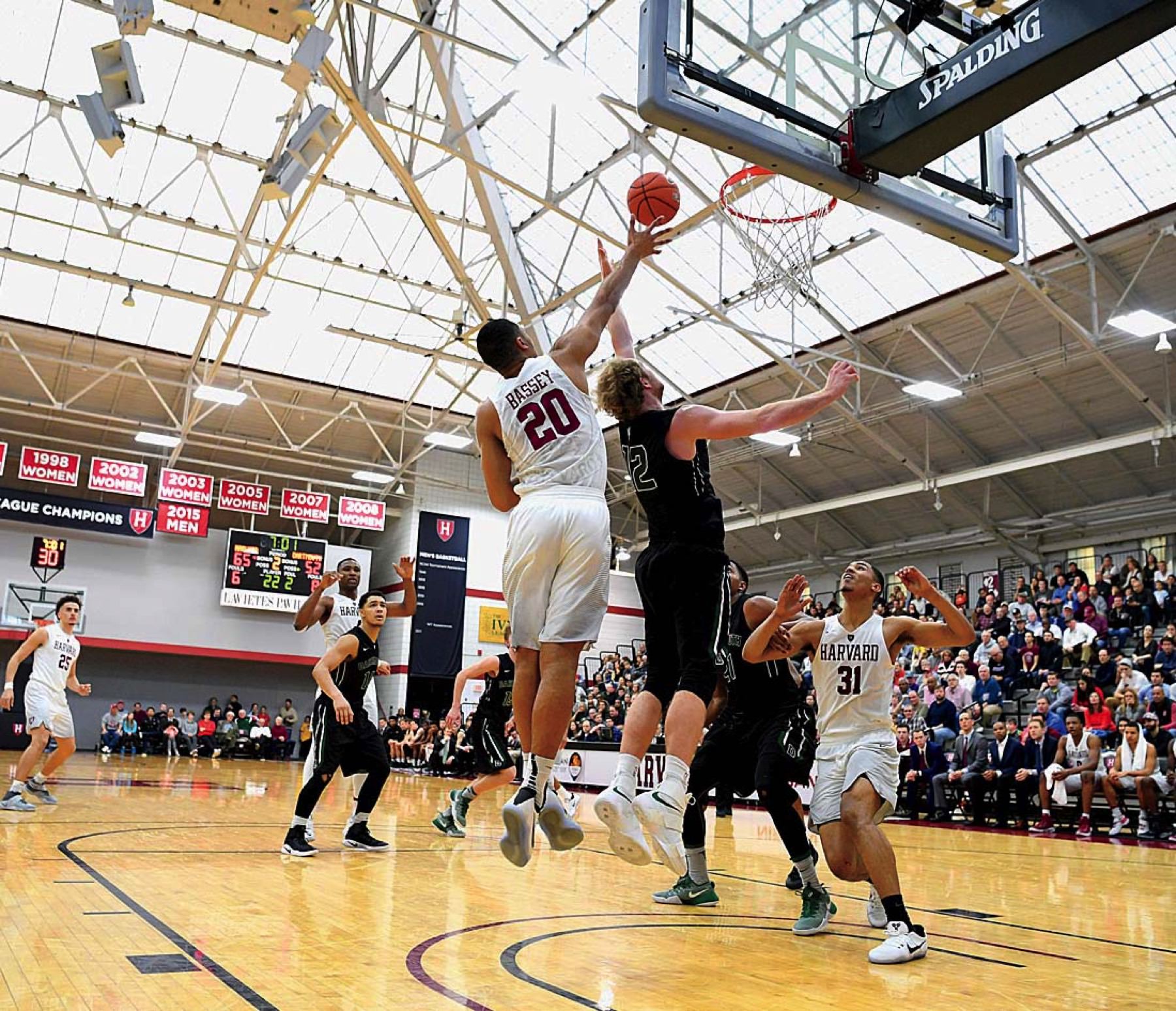
First-year Justin Bassey (#20) is part of one of the most talented freshman classes in Harvard history…
Photograph by Gil Talbot/Harvard Athletic Communications
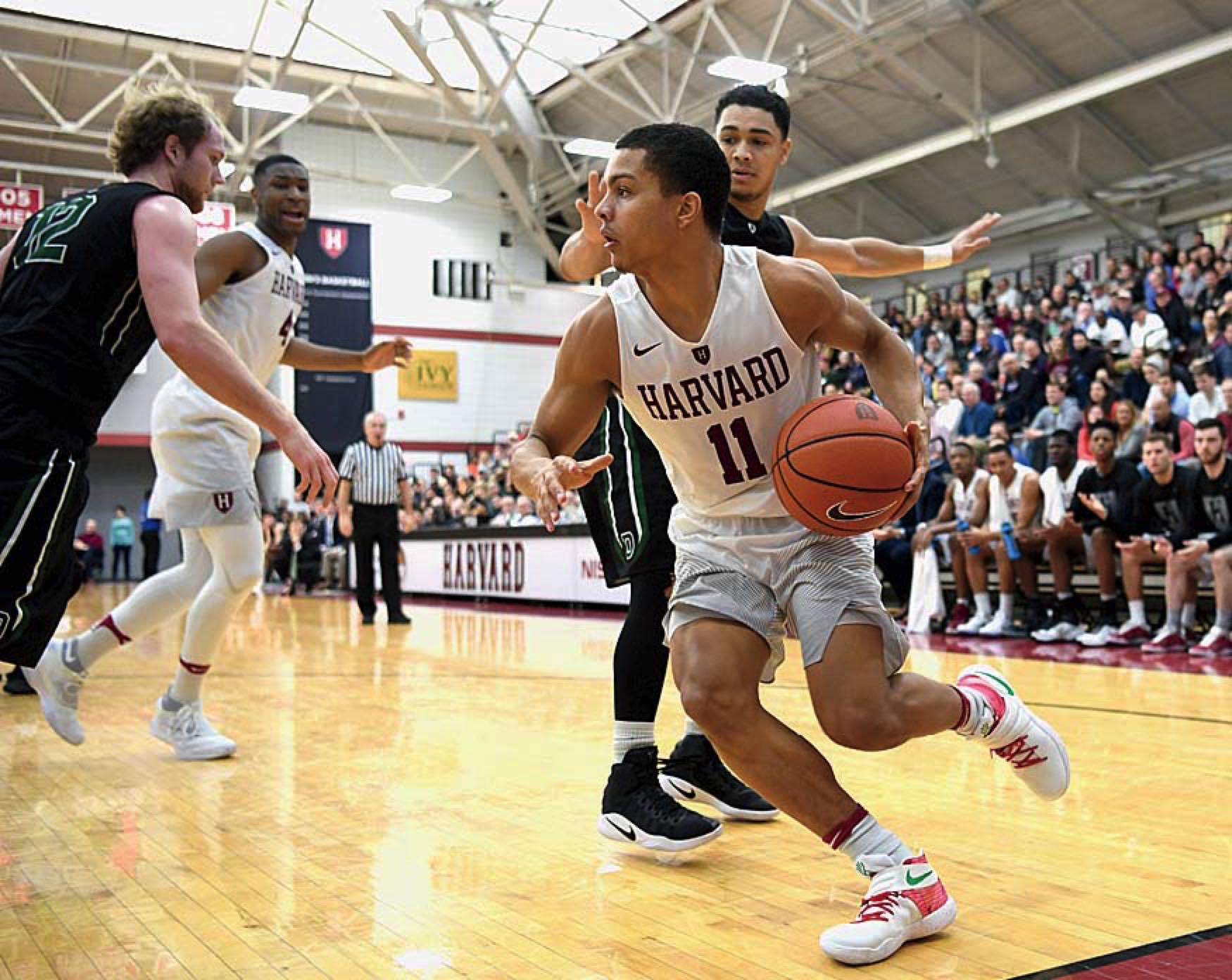
…as is classmate Bryce Aiken.
Photograph by Gil Talbot/Harvard Athletic Communications
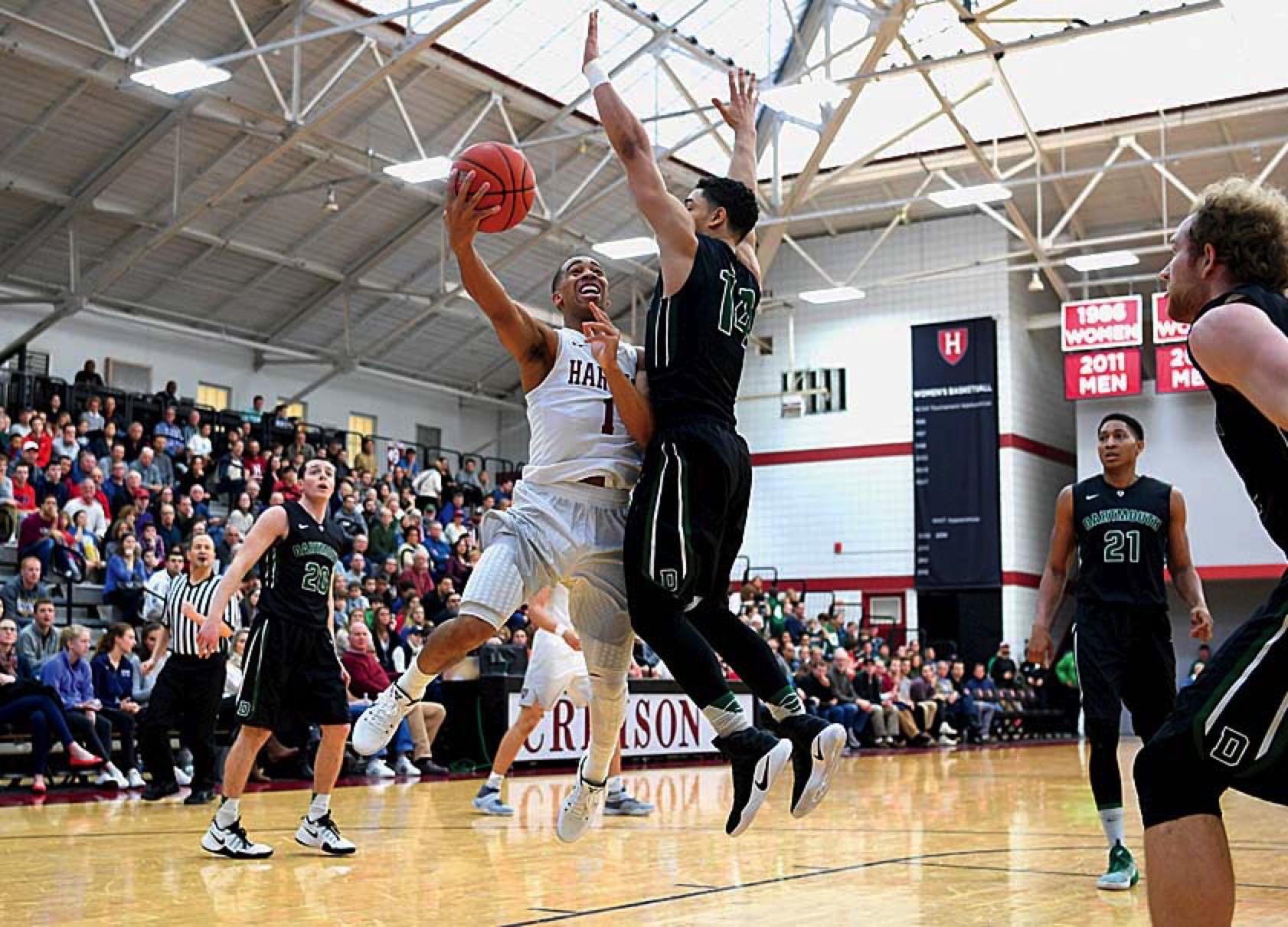
Co-captain Siyani Chambers ’16 (’17) leads the team in assists.
Photograph by Gil Talbot/Harvard Athletic Communications
So perhaps it was fitting that Corbin Miller ’15 (’17), a co-captain and the team’s oldest player, helped to stabilize the team in a home matchup with Fordham on December 3. A little over six minutes into the first half, Amaker sent Miller into the game. Three minutes later, he drained a three. Less than a minute after that: another three. Two more jumpers gave the Utah native 10 first-half points to stake Harvard to a 29-25 halftime lead and propel the Crimson to a 64-52 victory.
After the game, Amaker said that Miller’s shooting did more than change the scoreboard. “We haven’t been able to have those moments when we’re getting two and three of those shots to fall,” he pointed out, “getting a cushion or a lead and getting our guys some confidence.”
That provided a springboard for five consecutive victories, the most impressive a 57-56 upset over Houston, one of Harvard’s toughest opponents to date. The difference in that game was freshman point guard Bryce Aiken, who led the team with 21 points, including 13 in the second half to help spearhead a comeback. A resolute stop by Justin Bassey ’20 and a rebound by Siyani Chambers ’16 (’17) on the last possession also sealed the win and showed that the team was learning to defend without fouling.
Despite an early-January loss to Vermont, the Crimson sustained its momentum during the remainder of non-conference play and enjoyed a strong start to its Ivy slate, sweeping Dartmouth and splitting its annual road trip to Cornell and Columbia. Then came the biggest home weekend of the year: a matchup with Penn and Princeton, the pre-season Ivy favorite, on alumni weekend in early February.
The Crimson split those games, defeating Penn 69-59 on Friday evening before falling to Princeton 57-56 on Saturday, following a heartbreaking put-back by the Tigers’ Steven Cook with seconds left on the clock. The defeat left the Crimson two games behind Princeton in the loss column for first place in the Ivy League.
Entering the home stretch of the regular season, both Harvard teams appeared on their way to qualifying for the inaugural Ivy League basketball tournaments—creating an opportunity to avenge their early defeats in conference play and compete for a berth in the NCAA tournament.
March Madness lies ahead.
